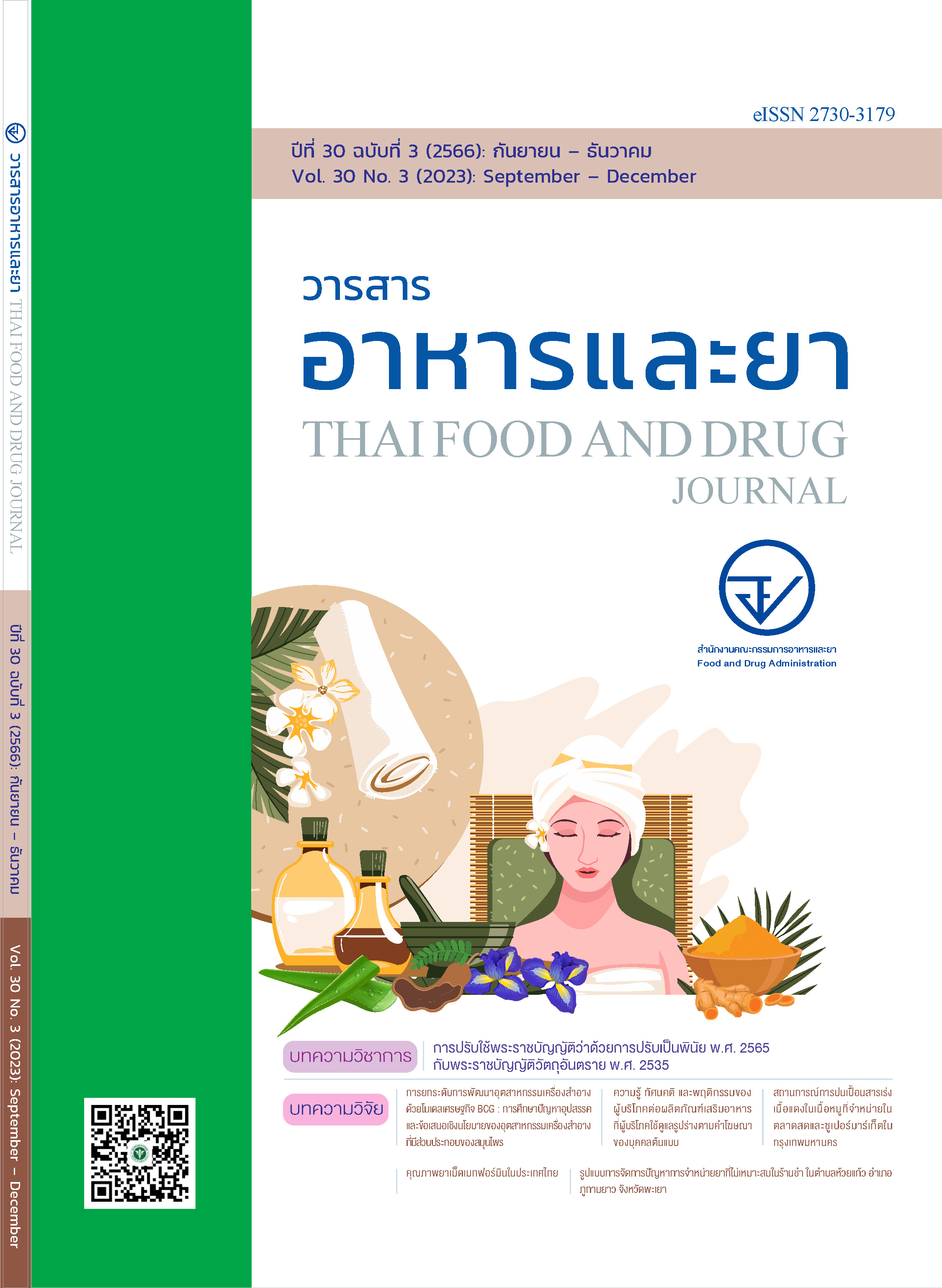การยกระดับการพัฒนาอุตสาหกรรมเครื่องสำอางด้วยโมเดลเศรษฐกิจ BCG: การศึกษาปัญหาอุปสรรคและข้อเสนอเชิงนโยบายของอุตสาหกรรมเครื่องสำอางที่มีส่วนประกอบของสมุนไพร
Main Article Content
บทคัดย่อ
ความสำคัญ: การเติบโตทางเศรษฐกิจของประเทศไทยในช่วงทศวรรษที่ผ่านมามีอัตราการขยายตัวทางเศรษฐกิจของประเทศเฉลี่ย ร้อยละ 3 ต่อปี ขณะเดียวกันเกิดผลกระทบจากการเสื่อมโทรมของทรัพยากรและความหลากหลายทางชีวภาพที่ลดลง ไทยจึงปรับรูปแบบการพัฒนาเศรษฐกิจและสังคมของประเทศด้วยโมเดลเศรษฐกิจชีวภาพ เศรษฐกิจหมุนเวียน เศรษฐกิจสีเขียว (BCG: Bio-Circular-Green Economy) ซึ่งผลิตภัณฑ์เครื่องสำอางเป็นหนึ่งในการยกระดับการพัฒนาอุตสาหกรรมสุขภาพและการแพทย์ อีกทั้งไทยเป็นแหล่งการปลูกสมุนไพรที่สำคัญ รวมถึงกระแสการบริโภคที่อนุรักษ์สิ่งแวดล้อม และให้ความสำคัญกับสุขภาพตามวิถีธรรมชาติและบำบัดอาการด้วยสมุนไพร ทำให้ผลิตภัณฑ์ที่ใช้วัตถุดิบจากธรรมชาติ ปลอดสารเคมี มีการผลิตที่เป็นมิตรกับสิ่งแวดล้อมจึงมีโอกาสเติบโตขยายตัวทางเศรษฐกิจ ดังนั้น เครื่องสำอางที่มีส่วนประกอบของสมุนไพรจึงเป็นผลิตภัณฑ์ที่ช่วยส่งเสริมเศรษฐกิจของประเทศได้
วัตถุประสงค์: เพื่อศึกษาช่องว่างของกลไกและมาตรการการขับเคลื่อนการพัฒนาประเทศไทยด้วยโมเดลเศรษฐกิจBCG ในเครื่องสำอางไทยที่มีส่วนประกอบของสมุนไพร ศึกษาสถานการณ์นำเข้าและส่งออกเครื่องสำอางที่มีส่วนประกอบของสมุนไพรในประเทศไทย และจัดทำข้อเสนอเชิงนโยบายผลักดันให้อุตสาหกรรมเครื่องสำอางมีส่วนประกอบของสมุนไพรสู่การขับเคลื่อนโมเดลเศรษฐกิจ BCG
วิธีการวิจัย: การศึกษานี้เป็นการวิจัยเชิงคุณภาพ ดำเนินการระหว่างเดือนมกราคม - พฤษภาคม 2566 ใช้ข้อมูลจากเอกสาร ข้อมูลการนำเข้าและส่งออกเครื่องสำอางที่มีส่วนประกอบของสมุนไพรปี 2565 และสุ่มตัวอย่างแบบเฉพาะเจาะจง โดยใช้แบบสอบถาม 3 ชุดในกลุ่มตัวอย่างเกี่ยวข้องโดยตรงกับอุตสาหกรรมในภาคเอกชน ภาคการศึกษา และภาคประชาชน
ผลการศึกษา: การศึกษาพบว่าช่องว่างของกลไกและมาตรการการขับเคลื่อนการพัฒนาประเทศไทยด้วยโมเดลเศรษฐกิจ BCG กับเครื่องสำอางไทยที่มีส่วนประกอบของสมุนไพร คือไม่มีคณะอนุกรรมการขับเคลื่อนการพัฒนาโมเดลเศรษฐกิจ BCG สาขาผลิตภัณฑ์เครื่องสำอาง ซึ่งเป็นหนึ่งในกลุ่มผลิตภัณฑ์ที่มีศักยภาพทางเศรษฐกิจและเป็นกลุ่มเศรษฐกิจเป้าหมายสุขภาพและการแพทย์ เป็นเหตุให้ขาดการติดตามการดำเนินงานที่เกี่ยวข้องกับเครื่องสำอาง ขาดความชัดเจนในการนำผลิตภัณฑ์เครื่องสำอางเข้าไปเชื่อมโยงในการขับเคลื่อนการพัฒนาระเบียงเศรษฐกิจ BCG ในแต่ละภูมิภาคโดยเฉพาะการท่องเที่ยวเชิงสุขภาพที่มีกลุ่มสปาเป็นจุดเชื่อมโยงกับผลิตภัณฑ์เครื่องสำอางและยังไม่มีการเชื่อมโยงฐานข้อมูลสมุนไพรระหว่างหน่วยงานที่วิจัย และ หน่วยงานที่กำกับดูแลผลิตภัณฑ์ที่เป็นรูปธรรมอย่างชัดเจน ในปี 2565 ข้อมูลการนำเข้าเครื่องสำอาง เครื่องหอมและสบู่ รวมถึงวัตถุดิบเพื่อใช้ทำเครื่องสำอางมีมูลค่าการนำเข้ารวม 48,590.31 ล้านบาท ขณะที่มูลค่าการส่งออกรวม 46,438.20 ล้านบาท ซึ่งมูลค่าการนำเข้าสูงกว่ามูลค่าการส่งออก ประเทศไทยมีการนำเข้าผลิตภัณฑ์เครื่องสำอาง เครื่องหอม และสบู่ รวมถึงวัตถุดิบเพื่อใช้ทำเครื่องสำอางจากประเทศต่าง ๆ โดยเรียงตามลำดับการนำเข้ามากที่สุด 3 ประเทศคือ ประเทศอาเซียน ร้อยละ 22.31 ประเทศจีน ร้อยละ7.80 และประเทศฝรั่งเศส ร้อยละ 5.72 และประเทศไทยส่งออกผลิตภัณฑ์เครื่องสำอาง เครื่องหอมและสบู่ รวมถึงวัตถุดิบเพื่อใช้ทำเครื่องสำอาง คือ ประเทศอาเซียนร้อยละ 19.33 ประเทศญี่ปุ่น ร้อยละ 10.53 และประเทศออสเตรเลีย ร้อยละ 6.09 ตามลำดับ สำหรับปัญหาอุปสรรคของการพัฒนาอุตสาหกรรมเครื่องสำอางฯด้วยโมเดลเศรษฐกิจ BCG คือปัญหาด้านการผลิตสินค้า พบว่าวัตถุดิบและบรรจุภัณฑ์มีการนำเข้ามากกว่า ร้อยละ 90 มีการปรับราคา ทำให้ต้นทุนสูง ด้านการตลาดและการจัดจำหน่าย พบว่าภาครัฐไม่มีมาตรการส่งเสริมการผลิตสินค้าที่เป็นมิตรต่อสิ่งแวดล้อม ด้านการเงิน พบว่าไม่มีมาตรการส่งเสริมการลงทุนสำหรับการผลิตผลิตภัณฑ์อุปโภคบริโภคที่เป็นมิตรกับสิ่งแวดล้อม ไม่มีการลดหย่อนภาษี ด้านสิ่งแวดล้อม พบว่าขาดกฎหมายกำหนดให้ผู้บริโภคคัดกรองเกี่ยวกับขยะ และด้านการพัฒนาอุตสาหกรรมด้าน BCG พบว่าบุคลากรภาครัฐ และภาคประชาชนขาดความรู้ ความเข้าใจและไม่เห็นความสำคัญของโมเดลเศรษฐกิจ BCG
ผู้วิจัยจึงได้จัดทำข้อเสนอเชิงนโยบายที่สำคัญคือ แต่งตั้งคณะอนุกรรมการส่งเสริมอุตสาหกรรมเครื่องสำอางที่มีส่วนประกอบของสมุนไพรภายใต้โมเดลเศรษฐกิจ BCG เพื่อกำหนดนโยบายให้ขับเคลื่อนแบบ top-down กำกับ ติดตาม ประเมินผลการดำเนินงานอย่างต่อเนื่อง และกำหนดนโยบายเพื่อพัฒนา และ/หรือส่งเสริมสนับสนุนการยกระดับอุตสาหกรรมเครื่องสำอางฯภายใต้โมเดลเศรษฐกิจ BCG โดยเรียงลำดับความสำคัญคือ ด้านการเพิ่มแก้ไขกฎหมาย กฎระเบียบเกี่ยวกับผลิตภัณฑ์คาบเกี่ยวระหว่างผลิตภัณฑ์ให้มีความรวดเร็วและทันต่อการเปลี่ยนแปลงของเทคโนโลยี เช่น ผลิตภัณฑ์ microneedle เพื่อความงาม เป็นต้น เนื่องจากปัจจุบันมีการพัฒนาผลิตสมุนไพรเพื่อความงามโดยใช้เทคโนโลยีที่เกินขอบเขตของความเป็นเครื่องสำอางตามพระราชบัญญัติเครื่องสำอาง แต่ไม่เข้าข่ายเป็นเครื่องมือแพทย์ตามพระราชบัญญัติ เครื่องมือแพทย์ นอกจากนี้ต้องกำหนดกฎระเบียบที่ชัดเจนโดยอ้างอิงมาตรฐานสากลที่ได้รับการยอมรับ เพื่อสามารถปรับปรุงงานวิจัยให้สอดคล้องกับความต้องการของรัฐและสังคมได้มากขึ้น ด้านการพัฒนากำลังคน ผู้เชี่ยวชาญ ลดการพึ่งพาผู้เชี่ยวชาญภายนอก และพัฒนาผู้เชี่ยวชาญเพื่อให้คำแนะนำด้านกฎระเบียบต่าง ๆ แก่ผู้ประกอบการ พัฒนาให้มีหน่วยงานที่เป็นศูนย์กลางการให้ข้อมูล ความรู้ ความเข้าใจ ที่ถูกต้องของผู้ประกอบการว่าผลิตภัณฑ์เข้าข่ายเครื่องสำอางหรือเวชสำอางสมุนไพร ด้านการพัฒนาโครงสร้างพื้นฐานและสิ่งอำนวยความสะดวก สามารถเชื่อมโยงฐานข้อมูลที่สืบค้นสารประกอบสมุนไพรที่ประเทศไทยอนุญาตให้ใช้ได้ในเครื่องสำอางกับหน่วยงานที่ดำเนินการแล้ว ด้านการสนับสนุนวิชาการ ความรู้ทางด้านเทคโนโลยี นวัตกรรม พัฒนาองค์ความรู้ของเทคโนโลยีการผลิตเครื่องสำอางที่ดำเนินธุรกิจภายใต้รูปแบบโมเดลเศรษฐกิจ BCG ให้แก่ภาคเอกชน กลุ่มวิสาหกิจชุมชน ด้านการพัฒนาเชิงพื้นที่ เน้นการมอบอำนาจ การพัฒนาองค์ความรู้ด้านกฎหมายและกฎระเบียบใหม่ที่จะบังคับใช้กับเจ้าหน้าที่ในแต่ละพื้นที่ ด้านการยกระดับเครือข่ายระหว่างประเทศ มีการสร้างหรือเพิ่มเครือข่ายระหว่างประเทศเกี่ยวกับการกำกับดูแลผลิตภัณฑ์เครื่องสำอางส่งออก ด้านแผนการปฏิบัติงานเพื่อพัฒนาอุตสาหกรรมเครื่องสำอาง มีแผนพัฒนาอุตสาหกรรมด้านวิชาการ ด้านมาตรฐานความปลอดภัยของผลิตภัณฑ์เครื่องสำอาง และด้านการสร้างตลาด สนับสนุนช่องทางการจำหน่ายผลิตภัณฑ์นวัตกรรมและบริการ BCG มีการโฆษณาที่ถูกต้องตามกฎหมาย รวมทั้งส่งเสริมฉลากที่เกี่ยวกับเศรษฐกิจชีวภาพ เศรษฐกิจหมุนเวียน และเศรษฐกิจสีเขียว
สรุป: การยกระดับการพัฒนาอุตสาหกรรมเครื่องสำอางที่มีส่วนประกอบของสมุนไพรโดยอาศัยโมเดลเศรษฐกิจ BCG สามารถขับเคลื่อนได้อย่างเป็นรูปธรรมโดยเร็วและยั่งยืน ถึงแม้ว่าจะเกิดช่องว่างของกลไกและมาตรการการขับเคลื่อนการพัฒนาประเทศไทยด้วยโมเดลเศรษฐกิจ BCG โดยเฉพาะแต่หากมีการบูรณาการความร่วมมือระหว่างภาครัฐ ภาคเอกชน ภาคการศึกษา และภาคประชาชน โดยอาศัยฐานความเข้มแข็งของประเทศที่ประกอบด้วยความหลากหลายทางชีวภาพและความหลากหลายทางวัฒนธรรมและ ใช้องค์ความรู้ทางด้านวิทยาศาสตร์ เทคโนโลยี และนวัตกรรม จะสามารถส่งเสริมและพัฒนาเศรษฐกิจได้บรรลุเป้าหมาย
Article Details

อนุญาตภายใต้เงื่อนไข Creative Commons Attribution 4.0 International License.
เอกสารอ้างอิง
สำนักงานพัฒนาวิทยาศาสตร์และเทคโนโลยีแห่งชาติ. แผนปฏิบัติการด้านการขับเคลื่อนการพัฒนาประเทศไทยด้วยโมเดลเศรษฐกิจ BCG พ.ศ. 2564-2570 [อินเทอร์เน็ต]. ปทุมธานี: สำนักงานพัฒนาวิทยาศาสตร์และเทคโนโลยีแห่งชาติ; 2564 [เข้าถึงเมื่อ 13 มิ.ย. 2566]. เข้าถึงได้จาก: https://waa.inter.nstda.or.th/stks/pub/bcg/20211228-BCG-Action-Plan-2564-2570.pdf
สำนักงานพัฒนาวิทยาศาสตร์และเทคโนโลยีแห่งชาติ. BCG economy model คืออะไร [อินเทอร์เน็ต]. กรุงเทพฯ: สำนักงานพัฒนาวิทยาศาสตร์และเทคโนโลยีแห่งชาติ; 2563 [เข้าถึงเมื่อ 10 พ.ค. 2566]. เข้าถึงได้จาก: https://www.nstda.or.th/home/knowledge_post/what-is-bcg-economy-model/
ฐานเศรษฐกิจ. เศรษฐกิจ: ตลาดสินค้าความงามฯ ใน ปท. คาดโต 10.4% [อินเทอร์เน็ต]. กรุงเทพฯ: ฐานเศรษฐกิจ มัลติมิเดีย; 2566 [เข้าถึงเมื่อ 13 มิ.ย. 2566]. เข้าถึงได้จาก: https://www.thansettakij.com/business/economy/555138
สมาคมผู้ผลิตเครื่องสำอางไทย. News: 3 เมกะเทรน์ เปลี่ยนตลาด ‘เครื่องสำอาง’ สร้างโอกาสผู้เล่นไทย ชิงแชร์ 3 แสนล้าน [อินเทอร์เน็ต], กรุงเทพฯ: สมาคมผู้ผลิตเครื่องสำอางไทย; 2566 [เข้าถึงเมื่อ 13 มิ.ย. 2566]. เข้าถึงได้จาก: https://www.thaicosmetic.org/index.php/tcmanews/news-from-media/89-3-3
กรมส่งเสริมการค้าระหว่างประเทศ. DITP เร่งขยายตลาดสมุนไพรไทย ยกระดับเพิ่มมูลค่าผลิตภัณฑ์สมุนไพร [อินเทอร์เน็ต]. กรุงเทพฯ. กรมส่งเสริมการค้าระหว่างประเทศ; 2563 [เข้าถึงเมื่อ 7 มิ.ย. 2566]. เข้าถึงได้จาก: https://www.thaipr.net/business/3232360
พระราชบัญญัติผลิตภัณฑ์สมุนไพร พ.ศ. 2562.ราชกิจจานุเบกษา เล่มที่136, ตอนที่ 56 ก (ลงวันที่ 30 เมษายน 2562).
สำนักงานพัฒนาวิทยาศาสตร์และเทคโนโลยีแห่งชาติ.สวทช. จับมือ 3 พันธมิตรสร้างฐานข้อมูลสมุนไพร หนุนเอกชนใช้งานด้านเครื่องสำอาง [อินเทอร์เน็ต]. กรุงเทพฯ. สำนักงานพัฒนาวิทยาศาสตร์และเทคโนโลยีแห่งชาติ;2563. [เข้าถึงเมื่อ 2 ก.ค. 2566].เข้าถึงได้จาก: https://www.nstda.or.th/home/news_post/nanotec-2/
กรมควบคุมมลพิษ.แผนแม่บทกระทรวงทรัพยากรธรรมชาติและสิ่งแวดล้อมระยะ20ปี (พ.ศ.2561-2580) [อินเทอร์เน็ต].กรุงเทพฯ;กระทรวงทรัพยากรธรรมชาติและสิ่งแวดล้อม;2564 [เข้าถึงเมื่อ 12 มี.ค. 2566].เข้าถึงได้จาก: https://www.mnre.go.th/attachment/iu/download.php?WP=qUIcnKt0pQSgZaqCGWOghJstqTgcWat1pQugZ3p2GQAgG2rDqYyc4Uux


